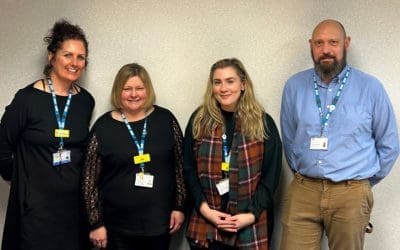There’s been a lot happening since we sent our last newsletter out in January. This includes a number of events many of you will have attended. Thank you for coming along if you did – we really welcome your engagement and feedback.
If you haven’t yet been able to join us at an event, don’t worry because there will be other opportunities and there are different ways you can get involved.
What is Community Mental Health Transformation?
A reminder:
- Community Mental Health Transformation is part of a national programme
- It’s about providing easier access and better support for adults with serious mental illnesses (SMI)
- There’s a focus on shorter waiting times
- Physical health checks are being promoted to prevent people with SMI from developing serious physical health conditions
- There is a particular focus on conditions like eating disorders and personality disorders
- Housing and employment are key elements of the programme
- A new assessment tool called DIALOG (see below) is being introduced which will help people who use services tell us what goals they want to achieve
- Locality Community Partnerships are being formed, to bring NHS organisations and community and voluntary sector partners together to provide more joined up support to meet people’s needs
The programme is being led by Gloucestershire Health and Care NHS Foundation Trust on behalf of NHS Gloucestershire, however it is a collaborative effort with partners and Voluntary and Community Sector organisations including the VCS Alliance, Inclusion Gloucestershire and the Independence Trust.
What is DIALOG?
The DIALOG scale is a needs-based assessment which asks questions about how satisfied (or dissatisfied) someone is with various elements of their life. This covers mental health, physical health, employment, housing, leisure activities, relationships/friendships, personal safety, medication, practical help, and meetings with mental health professionals. It is carried out when someone first seeks help and then at various times to track progress. If you use mental health services, you may soon find you are completing this tool when you are referred or have an appointment. Ask your care coordinator or professional about the DIALOG tool at your next appointment.
Mental Health Crisis Care Awareness Training
Free training is being offered to Voluntary, Community and Social Enterprise partners working with people with mental health needs in Gloucestershire.
The course will run over two consecutive mornings, via Zoom and is designed to develop mental health crisis care awareness.
The sessions look at what mental health is and what mental ill health is, including the biopsychosocial model. The course then looks briefly at a range of mental health conditions for example depression, anxiety, psychosis and bipolar disorder, borderline personality disorder / emotionally unstable personality disorder. It also considers the impact of Adverse Childhood Events (ACEs) on adults and their lives and then how we can support people when they are experiencing difficulties including the use of crisis and contingency plans. Finally, the course looks at self-harm and how we can all help those who have suicidal thoughts and behaviours. The effect of the Covid-19 pandemic and current cost of living crisis on all of us will run as a theme through the training as well as aligning to the objectives of the Mental Health Community Transformation Programme.
Booking is via proudtolearn@gloucestershire.gov.uk.
Initial Dates
April 17th & 18th 9am—1pm
April 24th & 25th 9am—1pm
May 2nd & May 3rd 9am—1pm
May 9th & May 10th 9am—1pm
Frequently Asked Questions
Why are physical health checks for people with serious mental illness important?
Compared with the general patient population, patients with severe mental illnesses are at substantially higher risk of obesity, asthma, diabetes, chronic obstructive pulmonary disease (COPD) and cardiovascular disease. People with a long-standing mental health problem are twice as likely to smoke, with the highest rates among people with psychosis or bipolar disorder.
Annual Physical Health Checks for people with severe mental illness (SMI) are designed to pick up on signs that someone may be at risk of diabetes, stroke or heart problems. This means action can be taken before these issues become more serious.
What is the new Complex Emotional Needs Service?
Work started in September 2021 to form a team supporting professionals who were working with people with Complex Emotional Needs.
The team, which currently covers Gloucester, includes psychologists, a social worker, a mental health nurse and lived experience practitioners. The team is working with the police, paramedics, A&E staff, supported living environments and voluntary care sector agencies. You can read more about them and their work on our webpage www.ghc.nhs.uk/cmht




